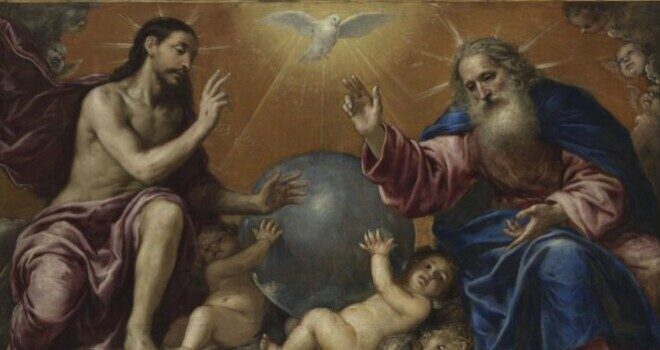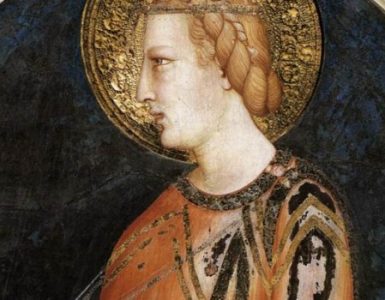On this first Sunday after Pentecost, the Church calls us to remember the Most Holy Trinity. Why is this perfect timing?
Gospel (Read Mt 28:16-20)
Ever since the first day of Advent, the Church has been liturgically moving us through the history of the One Life that changes all our lives. Christianity is a religion with a footprint within human history. From the beginning, God revealed Himself to mankind in time and space. This revelation was slow, and it came in stages.
The formation of the nation of Israel revealed that there was no other god in heaven or earth beside Yahweh, the God Who entered a covenant with flesh-and-blood people to make them His own. The history of Israel revealed that God’s people could not keep faith with Him. The Incarnation revealed that God has a Son Whom He sent to deliver from weakness both Israel and all of lost mankind. The Resurrection and Ascension revealed that the Son was victorious in His mission. Pentecost revealed that the purpose of the Son’s work of deliverance was to form a new humanity, born not of the will of the flesh but of God. When the Son ascended to the Father’s right hand, God sent the Holy Spirit upon the apostles to fully initiate them into the New Covenant—to live with God forever, in the same way the Father and Son abide together. Right away, the apostles began to extend to others what they had received. The Church was born.
Now, the historical revelation of God is complete. We don’t know all we want to know about Him, but we know all we need to know. That is why, today, we pause to contemplate a mystery that was revealed while all these historical events were unfolding, in time and space. That mystery is that God is a communion of Persons, the Blessed Three in One. What difference does this make to us?
To begin to answer that question, we should pay attention to our lectionary readings. First, we see that in the Gospel, Jesus’ commission to the apostles is, “Go… and make disciples of all nations, baptizing them in the Name of the Father, and of the Son, and of the Holy Spirit.” Because He completed the work His Father gave Him to do (making salvation possible for all humanity), the Father gave “all power in heaven and on earth” into His hands. Likewise, Jesus gives this same work over to His Church. On Pentecost, the apostles received the power to make salvation possible, by preaching the Good News of Jesus. What would be the content of that message? They would announce to the world that, because of Jesus, God’s original intention in creating mankind (“let Us make man in our image,” see Gn 1:26) can now be realized. By baptizing believers in the Triune Name of God, the Church declares that we can share the life of the “Us” who have always desired our fellowship. Mere mortals can now live divine life! That is why Jesus tells the apostles to teach the world “to observe all that I have commanded you.” The life Jesus teaches us to live is supernatural—a life of love lived in the power of Love Itself. This is what we were designed to do. The “Us” at Creation built this into us. Now, as we have liturgically remembered all the historical events making it possible, we spend this Sunday cherishing the revelation of the “Us,” and that we are “Us,” now, too.
Amazing, isn’t it?
Possible response: Blessed Trinity, thank You for all that You have done in history to welcome me into Your fellowship.
First Reading (Read Dt 4:32-34, 39-40)
Amazed is what we should be on Trinity Sunday, as we contemplate all that God has revealed to us about Himself in salvation history. In this reading, we have an opportunity to see another occasion of human amazement over revelation God has made to mortals like us. See how Moses can barely restrain himself as he expresses his amazement over the first stage of God’s revelation within time and space: “Ask now of the days of old, before your time, ever since God created man upon the earth; ask from one end of the sky to the other: Did anything so great ever happen before? Was it ever heard of? Did a people ever hear the voice of God speaking…and live?” Moses simply can’t find words enough to describe the awe the Israelites should experience for God’s revelation of Himself in their midst. God had made it abundantly clear to His people that none of the so-called gods of Egypt could prevent Him from delivering His people from bondage there. Thus, the first stage of revelation was accomplished: “The Lord is God in the heavens above and on earth below…there is no other.” Then, just as Jesus did when He confirmed the full revelation of God as Father, Son, and Holy Spirit in our Gospel reading, Moses exhorted the people to live as God had directed in His “statutes and commandments.” That kind of life is the one that prospers. That is the life for which we are made.
So, long before Israel learned about the Trinity, they knew about God the Father—their Father. God is One. Nothing has changed that. In time, in space, mankind then learned that God is One in Three Persons. In ancient polytheistic religions, it was thought that many gods inhabited the universe, each with its own story and cultic following. There could be rivalry and petulant competition among them. The first stage of God’s revelation had to establish the Oneness of God. The final stage established the Three-in-Oneness of God, a perfect unity. He is a Communion Who invites us into communion.
Let’s use Moses’ words to respond to this: “Did anything so great ever happen before?”
Possible response: Blessed Trinity, to know that You are a Communion of love helps me understand why my own vocation is love, too. Please help me live it today.
Psalm (Read Ps 33:4-6, 9, 18-20, 22)
This psalm praises many of God’s characteristics, but one is especially evident: kindness. It is in three of its four stanzas. Interestingly, in the one stanza not containing the word “kindness,” we see a muted foreshadowing of the Trinity: “By the word [Jesus] of the Lord the heavens were made; by the breath [the Holy Spirit] of His mouth all their host.” The psalmist would not have known that he was actually describing the Three-in-Oneness of God. He simply wanted to extol God’s rich kindness to His people. Now, in our time, we can understand the full meaning of that kindness, revealed most vividly in the Trinity. Knowing this, we can say about ourselves what our responsorial acclaims: “Blessed the people the Lord has chosen to be His own.”
Possible response: The psalm is, itself, a response to our other readings. Read it again prayerfully to make it your own.
Second Reading (Read Rom 8:14-17)
St. Paul gives us a very simple, practical description of the believer’s relationship with the Trinity. It is one thing to know that God is Father, Son, and Spirit, but we might still wonder: how does that affect me? St. Paul says it is the Spirit Who makes us “sons of God.” We know He is present in us when, in times of trial or difficulty, we find that our deepest heart response is to cry out to God, “Abba, Father!” Without the Spirit, the same difficulty would make us shrink back away from God in fear, as a slave would fear his master. When we have been baptized into the Holy Spirit, we may still have fear, of course, but our fear drives us to and not away from God. The Spirit’s work is to assure us that we are God’s children, that He loves us, that we are as dear to Him as is Jesus. To confirm this, St. Paul says we are “joint heirs with Christ.” What did Christ, the Son, “inherit” from His Father? God gave all power in heaven and on earth to Him. In baptism, we, too, “inherit” this kingdom from the Father. Here we see the whole Trinity at work in our lives: God (our Father), Jesus (our Brother), and the Spirit (making our “adoption” concrete and real in our souls).
Notice that St. Paul says that all this is ours “if only we suffer with Him so that we may also be glorified with Him.” What’s this all about? This exhortation is not much different in substance from what both Jesus and Moses said in our other readings. Upon acknowledging a revelation of truth about God, they urged God’s people to “observe the commandments” as a response to the great work of God on our behalf. Obedience to God is the key to a blessed life. We know that to obey God means not to obey ourselves. To do God’s will is not to do our own. Jesus invited His followers to take up their crosses and follow Him through self-denial (a kind of death, certainly a kind of suffering). Because of our baptism, we have the grace to actually do this now.
The path to life with the Trinity—the life for which we were designed, made possible for us through the loving work of the Trinity—is a path of dying and rising. Where does this path take us? Glory! Let us not shrink back in fear.
Possible response: Abba, Father! Into Your hands I commend my spirit.
de Pereda, A. (1659). The Holy Trinity. [oil on canvas]. Retrieved from Museum of Fine Arts, Budapest.










